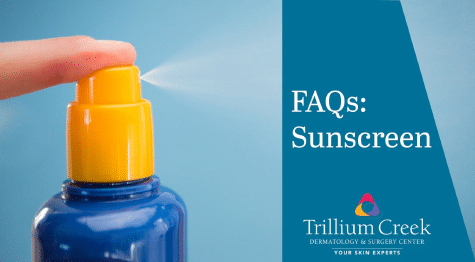
It’s time to soak up the sun, in a responsible way of course! And while you should use sunscreen every day of the year, it’s even more important during these summer months. The days are longer and brighter, making it easier to spend more time outside.
If you’ve navigated a sunscreen/skincare aisle recently, you’ve seen a host of marketing buzzwords and really high SPF contents. We’re breaking down some common questions when it comes to sun defense:
- What does broad spectrum mean? When it comes to sun protection, you want a sunscreen that blocks UVA and UVB rays. Overexposure to both can lead to skin cancer but UVA rays can prematurely age your skin by causing wrinkles, age spots and other blemishes. All sunscreen products protect against UVB rays, which cause your skin to burn. “Broad spectrum” means the sunscreen blocks both of these harmful rays and has passed a test to insure its duel protection level.
- How much SPF is enough? The American Academy of Dermatology recommends any sunscreen you use have an SPF of at least 30. However, a higher SPF doesn’t actually mean more protection. The higher an SPF goes, the smaller the difference in filtered UVB rays. For example, if you select an SPF 30 sunscreen, it filters out about 97 percent. When you bump it up to SPF 50, that’s around 98 percent and SPF 100 is roughly 99 percent. No sunscreen can block 100 percent of UVA or UVB rays.
- What’s the difference between waterproof and water resistant? No sunscreen is waterproof, period. The FDA has banned the use of “waterproof” on sunscreen labels. There is also a label requirement on all water resistant sunscreen that dictates either 40 or 80 minutes of protection.
- How often should I reapply? At a minimum, with no water or sport activities, you should reapply every two hours. If you are swimming or sweating, you will need to apply every 40 or 80 minutes, per the label’s instructions. Another important factor: when you dry off or use a towel, you are wiping off any coverage. So, if you just hop in and out of the pool for less than 40 minutes, you should reapply. Or if you wipe the sweat away after a short bike ride or hike, you should reapply.
If you are ever in doubt about your sunscreen protection, reapply. There is no harm in overlapping coverage but there can be serious consequences for under applying. Just one blistering sunburn, especially when you’re young, can double your risk of developing melanoma.
About Trillium Creek Dermatology: Few places in the country offer the quality care, innovation and state-of-the-art procedures that are available at Trillium Creek. Through our integrative medicine approach, Trillium offers world-class general dermatology, dermatologic surgery, laser surgery, cosmetic dermatology, skin cancer treatment, Mohs surgery and holistic medicine.


